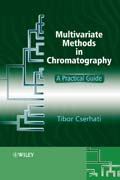
Presenting a compilation and extensive evaluation of the newest results in the rapidly developing domain of chromatography, Multivariate Methods in Chromatography: A Practical Guide includes a brief enumeration of the methods applied, critical discussion of the results, and elucidation of the impact of multivariate methods on the practice and theory of chromatography. Emphasizing practical applications, the book is written specifically for researchers and advanced students working in this area. INDICE: Preface. Chapter 1. Fundamentals. 1.1. Multilinear and nonlinear regression analyses. 1.2. Stepwise regression analysis and partial least squares method. 1.3. Two and three-dimensional principal component analysis, variousfactor analytical techniques. 1.4. Canonical correlation analysis. 1.5. Discriminance analysis. 1.6. Spectral mapping. 1.7 Nonlinear mapping. 1.8. Cluster analysis. 1.9. Other multivariate techniques (fixed-size window movement, rankannihilation, etc). 1.10. Measured and calculated physicochemical parameters of chromatographis systems and analytes. Chapter 2. Gas Chromatography (GC). 2.1. Theory and practice of gas chromatography. 2.2. Comparison of GC stationary phases using homogenous and non-homogenous set of analytes. 2.3. Elucidationof similarities and dissimilarities among samples. 2.3.1. Human health and pharmaceuticals. 2.3.2. Forensic analyses. 2.3.3. Biology and agrobiology. 2.3.4. Food and food products. 2.3.4.1. Wines. 2.3.4.2. Oils. 2.3.4.3. Foods of plant origin. 2.3.4.4. Miscellaneous food products. 2.3.5. Environmental analyses. 2.3.5.1. Volatile organic compounds (VOC), polycyclic aromatic hydrocarbons (PAH), and polychlorinated biphenyls (PCB). 2.3.5.2. Miscellaneous environmental pollutants. 2.3.5.3. Gasoline. 2.3.6. Other synthetic compounds. 2.3.7. Miscellaneous applications. Chapter 3. Liquid Chromatography (LC). 3.1. Thin-layer chromatography (TLC). 3.1.1. Theory and practice of thin-layer chromatography. 3.1.2. Multidimensional classification of TLC stationary and/or mobile phases. 3.1.3. Relationships between molecular parameters and TLC retention of analytes. 3.1.3.1. Pharmaceuticals and natural organic compounds. 3.1.3.2. Fatty acids and bile acids. 3.1.3.3. Pesticides and pesticide adjuvants. 3.1.4. Relationship between TLC retention parameters and biological activity of analytes.3.1.5. Miscellaneous applications. 3.2. High performance liquid chromatography (HPLC). 3.2.1. Theory and practice of HPLC. 3.2.2. Multidivariate classification of HPLC stationary and/or mobile phases. 3.2.2.1. Classification of stationary or mobile phases. 3.2.2.1.1. Principal component analysis (PCA). 3.2.2.1.2. Other multivariate techniques. 3.2.2.4. Classification of chromatographic systems. 3.2.2.4.1. Multilinear and multi nonlinear regression analyses (MLR and MNLR). 3.2.2.4.2. Principal component analysis (PCA), cluster analysis (CA)and other multivariate techniques. 3.2.3. Differentiation between homologous and non-homologoues sets of analytes. 3.2.3.1. Human health. 3.2.3.2. Biological applications. 3.2.3.3. Agrobiochemistry. 3.2.3.4. Microbiology. 3.2.3.5. Natural (herbal) medicines. 3.2.3.6. Synthetic pharmaceuticals. 3.2.3.7. Wines. 3.2.3.8. Cheeses. 3.2.3.9. Miscellaneous foods and food products. 3.2.3.10. Polycyclic aromatic hydrocarbons. 3.2.3.11. Pesticides and homologous series of pollutants. 3.2.3.12. Non homologous series of pollutants. 3.2.3.13. Other environmental pollutants. 3.2.3.14. Miscellaneous HPLC applications. Chapter 4. Electrically Drived Systems. 4.1. Theory and practice of electrically drived systems. 4.2. Gel electrophoretic techniques. 4.2.1. Theory and human health aspects. 4.2.2. Microorganisms. 4.2.3. Microbial communities. 4.2.4. Plant tissues. 4.3. Capillary zone electrophoresis (CZE). 4.3.1. New advances in CZE theory. 4.3.2. Human health and pharmacology. 4.3.3. Other applications. 4.4. Micellar electrokinetic chromatography (MEKC) and related technologies.
- ISBN: 978-0-470-05820-6
- Editorial: John Wiley & Sons
- Encuadernacion: Cartoné
- Páginas: 335
- Fecha Publicación: 01/08/2008
- Nº Volúmenes: 1
- Idioma: Inglés
